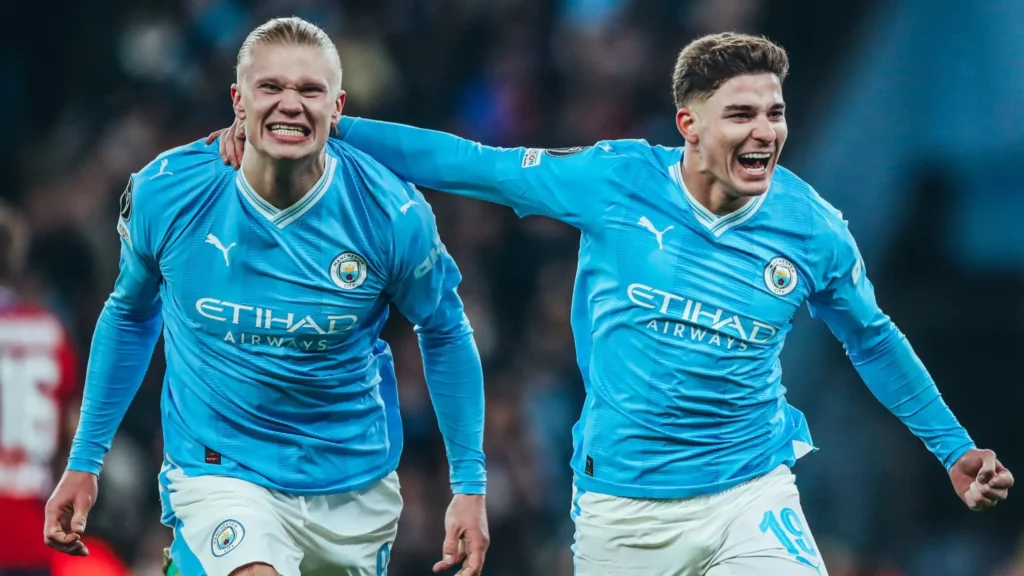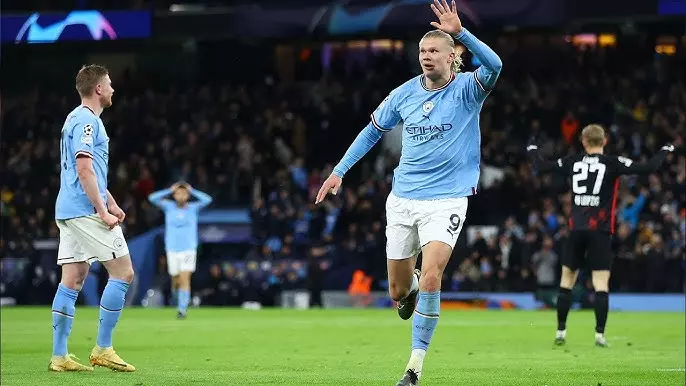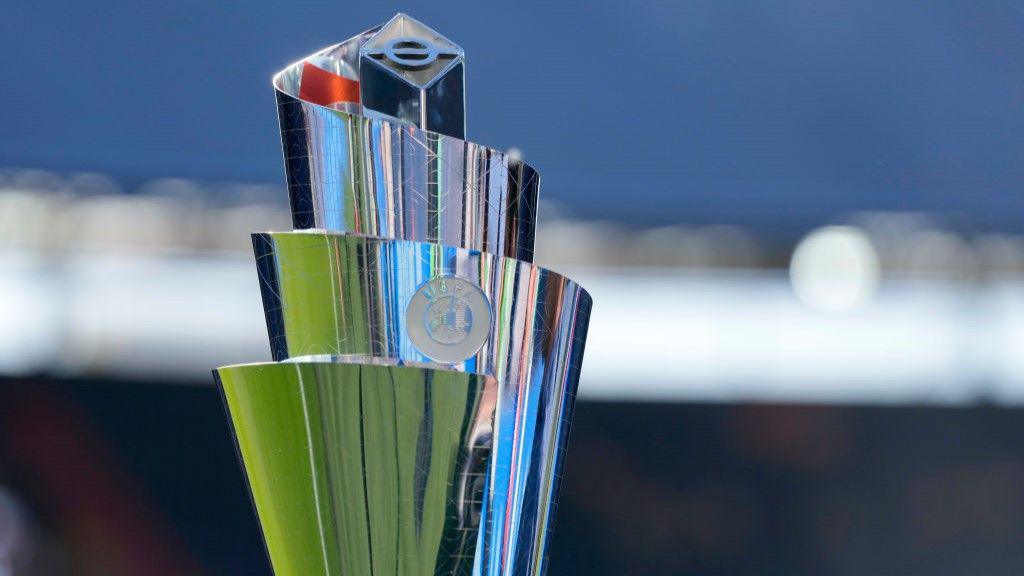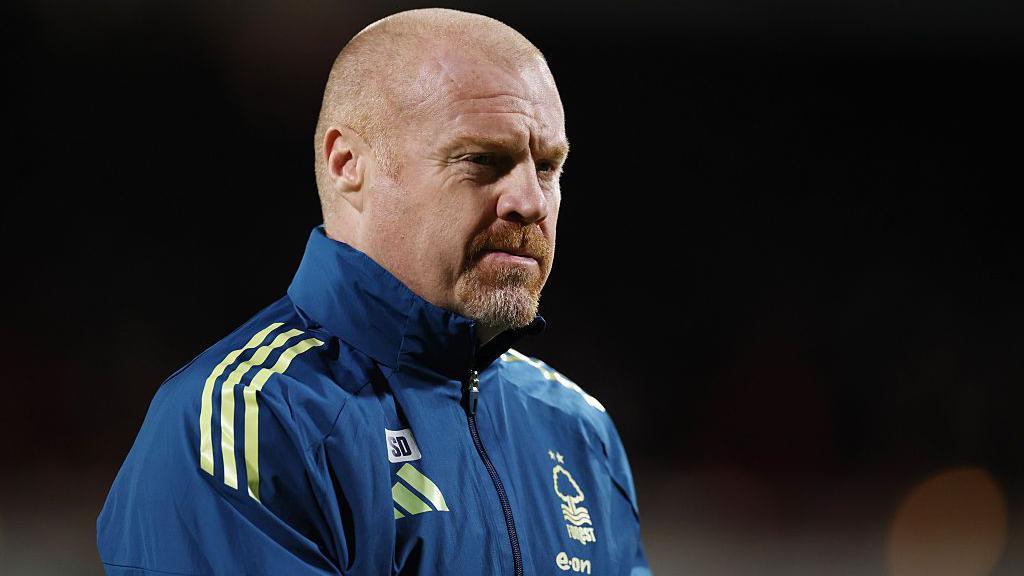
In a stunning display of resilience and tactical prowess, Manchester City, under the guidance of Pep Guardiola, turned a looming defeat into an exhilarating victory against RB Leipzig. The match, which saw City trailing 2-0 at halftime, ended in a dramatic comeback, underscoring their tenacity and Guardiola’s strategic acumen.
The First Half: A Tale of Defensive Woes
The game started unfavorably for Manchester City. Leipzig’s attacking prowess quickly exposed gaps in City’s defense, with Manuel Akanji’s errors leading to Loïs Openda’s early strike. The home team struggled to find rhythm and cohesion, with their usual fluid play disrupted by Leipzig’s high press and organized defense.
City’s Early Struggles
- Defensive Lapses: City’s backline, typically robust and coordinated, was caught off guard by Leipzig’s aggressive forward play.
- Lack of Offensive Sync: Despite efforts from seasoned players like Bernardo Silva and Rúben Dias, City failed to convert their chances, summing up a half of missed opportunities and disjointed play.
This first-half performance was amongst the most challenging under Guardiola’s tenure, with City’s players seeming out of sync and unable to penetrate Leipzig’s disciplined defense.
Guardiola’s Halftime Ingenuity
Recognizing the need for a drastic change, Guardiola made pivotal decisions during the halftime break. Known for his tactical insight, Guardiola’s ability to read the game and adapt his strategies was put to the test.
The Tactical Adjustments
- Substitution Strategy: Guardiola’s decision to bring on Julián Álvarez and Jérémy Doku early in the second half proved to be a masterstroke.
- Formation Changes: Adjusting the team’s structure to facilitate more direct and aggressive play, Guardiola aimed to disrupt Leipzig’s defensive setup and reignite City’s attacking prowess.
These changes marked a significant shift in the game’s dynamic, showcasing Guardiola’s expertise in altering tactics to suit the situation.

The Second Half: City’s Remarkable Comeback
The second half saw a rejuvenated Manchester City, with the introductions of Álvarez and Doku injecting energy and creativity. Their impact was almost immediate, helping City regain control and push for a comeback.
Key Moments in City’s Fightback
- Erling Haaland’s Goal: Haaland’s goal early in the second half was a crucial turning point, reducing the deficit and igniting City’s hopes of a comeback.
- Phil Foden’s Equalizer: Demonstrating individual brilliance, Foden’s equalizing goal brought the score level, setting the stage for City’s eventual win.
- Álvarez’s Winning Goal: A perfect culmination of City’s efforts, Álvarez’s goal completed the comeback, highlighting the effectiveness of Guardiola’s tactical changes.
This second-half performance was a stark contrast to the first, with City showing the kind of relentless pursuit and adaptability that has become synonymous with Guardiola’s management.
Guardiola’s Mixed Reflections Post-Match
Despite the euphoria of a stunning victory, Guardiola’s post-match reflections were a blend of pride and critique. He praised the team’s spirit and resilience in overturning the deficit but was candid about their shortcomings, especially in the first half. Guardiola emphasized the need for a more consistent and disciplined performance across the full 90 minutes.
Leipzig’s Resistance and Tactical Play
RB Leipzig, who started the game strongly, tried to maintain their structured play in the face of City’s resurgence. They remained disciplined in their defensive strategy, initially stifling City’s attempts at recovery. However, as the second half progressed, they found it increasingly difficult to contain City’s rejuvenated attack.
Conclusion: A Night of Tactical Brilliance and Resilience
Manchester City’s comeback victory against RB Leipzig was not just a testament to their skill and determination but also a display of Guardiola’s tactical brilliance. The match highlighted the importance of adaptability, strategic changes, and the ability to respond to challenging situations. This remarkable win secured City’s top spot in their group and served as a valuable lesson in the importance of resilience and tactical flexibility in elite football. As Manchester City move forward in the competition, they will look to build on this experience, aiming for consistent performances and further success under Guardiola’s astute leadership.





















